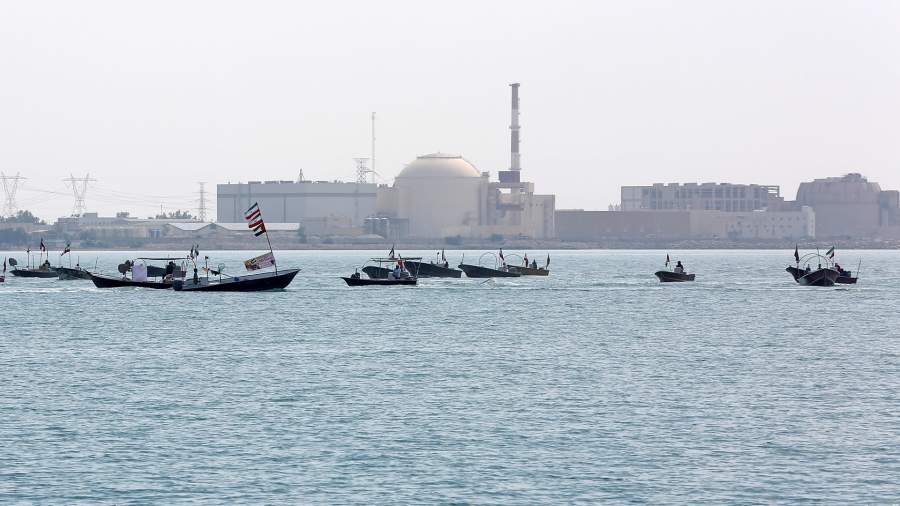Nuclear synergy: Russia, China and Iran may discuss nuclear issues again

Russia, China and Iran may meet again at the level of deputy foreign ministers on nuclear issues, Mikhail Ulyanov, Russia's permanent representative to international organizations in Vienna, told Izvestia. Although the date of the upcoming meeting has not yet been determined, contacts in the troika format are continuing. The Russian diplomat announced that a meeting of permanent representatives of the three countries would be held in Vienna on May 29 to coordinate work before the session of the IAEA Board of Governors. Russia's offer to help Iran and the United States negotiate a nuclear deal remains in force, but Moscow has not yet received such requests from Tehran and Washington, the permanent representative added. How the Oman track of the US-Iranian nuclear talks is progressing is in the Izvestia article.
Russia, China and Iran coordinate approaches on the nuclear issue
Russia, China and Iran may once again hold high-level trilateral consultations on nuclear issues. Mikhail Ulyanov, Permanent Representative of the Russian Federation to International Organizations in Vienna, told Izvestia about this. According to him, the situation is developing dynamically and another meeting at the level of deputy foreign ministers may well be required. A specific date has not yet been determined, but diplomatic cooperation between the three countries continues: on May 29, a meeting of permanent representatives was held in Vienna, timed to coincide with the upcoming session of the IAEA Board of Governors.
— The situation around the Iranian nuclear program is developing dynamically, and this may well require another round of consultations between Russia, China and Iran on this issue at the level of deputy foreign ministers. There is no specific date yet," Mikhail Ulyanov said.
Recall that the last high-level trilateral meeting was held on April 8 in Moscow, where representatives of Russia, China and Iran discussed the current situation around the Joint Comprehensive Plan of Action (JCPOA) and the implementation of UN Security Council resolution 2231. Similar talks were held in Beijing on March 14.
— In any case, the trilateral format is actively functioning — on May 29, another "clock reconciliation" took place in Vienna at the level of permanent representatives of the three countries to international organizations. There is a need to coordinate steps ahead of the session of the IAEA Board of Governors that opens on June 9," the Russian permanent representative said.
One of the possible areas of work of the trilateral group remains the promotion of dialogue between Tehran and Washington.
— The Russian Federation has repeatedly stated its readiness to assist Iran and the United States in reaching an agreement on the nuclear issue. But this requires that both Tehran and Washington make such a request to us. So far, there has been no such appeal," Ulyanov explained.
Negotiations in the troika format are important for developing a common approach. Iran has recently held similar discussions with representatives of the United Kingdom, France and Germany. These meetings help to coordinate a common position, Vladimir Sazhin, senior researcher at the Center for the Study of the Near and Middle East at the Institute of Oriental Studies of the Russian Academy of Sciences, told Izvestia.
US-Iran talks in Oman
At the same time, the US-Iranian negotiations in Oman are now considered a key element. It is based on the results of these meetings, depending on the agreements reached, that it will be possible to talk about the possible involvement of other participants, such as Russia, China or European countries.
The first official meeting of representatives of Iran and the United States this year was held in Muscat on April 12. On May 23, the parties held the fifth round of indirect talks in Rome, in which Oman again acted as a mediator. Following the consultations, the Sultanate's Foreign Minister, Badr bin Hamad bin Hamoud Al-Busaidi, reported "definite but not definitive progress." Iranian Foreign Minister Abbas Araqchi announced the mechanisms proposed by Oman that can help remove obstacles to progress in the negotiations. Such progress, according to the Iranian minister, is possible in one or two rounds.
At the same time, the contradictions between the parties escalated before the fifth round. So, before the negotiations, the United States demanded that Iran abandon uranium enrichment. The Iranian side rejected such demands, pointing out that the parties would not be able to reach an agreement if the United States insisted on Tehran's abandonment of enrichment technology.
At the same time, Iran admitted the possibility of reducing the level of uranium enrichment, and also spoke of its readiness to allow greater control over its nuclear activities in order to demonstrate the peaceful nature of the Iranian nuclear program. Mohammad Eslami, head of the Atomic Energy Organization of Iran (AEOI), said that Iran, in the case of a deal with the United States, is ready to allow American inspectors from the IAEA to visit its nuclear facilities.
Meanwhile, tensions in the region continue to rise. On May 21, CNN, citing sources in American ruling circles, reported that Israel was considering the possibility of attacking Iran's nuclear infrastructure.
Such intentions may be an attempt to force Tehran to make concessions or even disrupt the course of the US-Iranian negotiations. At the same time, the American administration, apparently, is not interested in escalation. US President Donald Trump said he had warned Israeli Prime Minister Benjamin Netanyahu against taking steps that could disrupt the negotiation process.
Переведено сервисом «Яндекс Переводчик»


